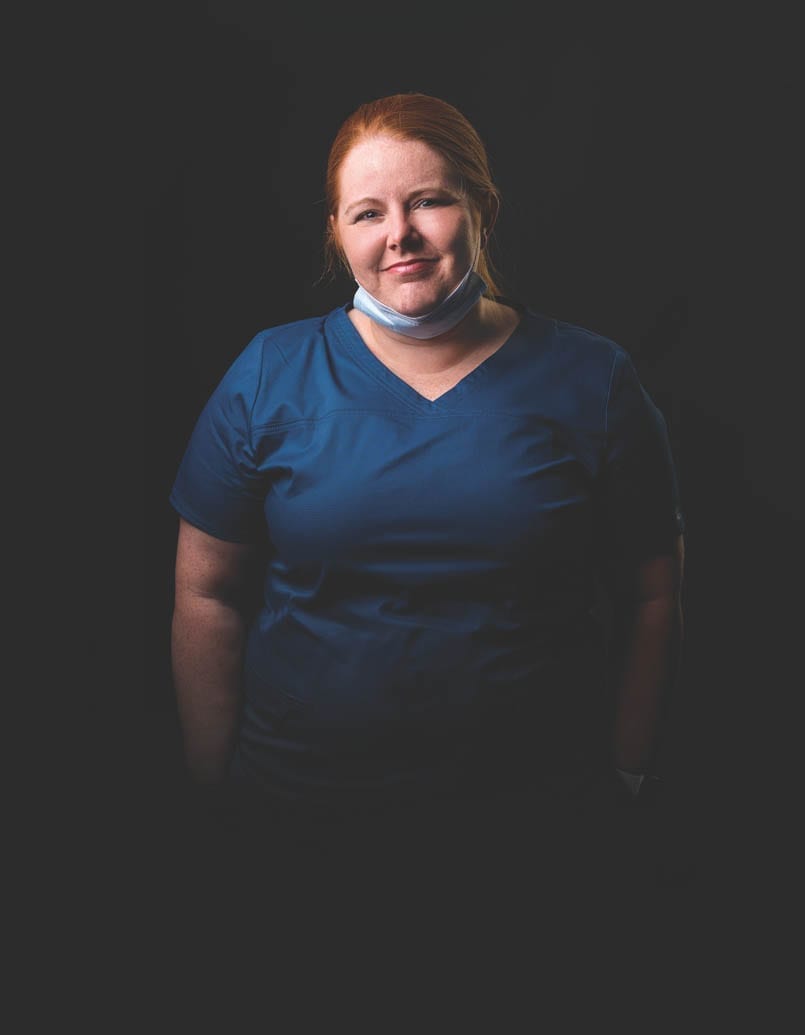31 Jan 2021 Lean on Me: Noelle Bradley loves serving veterans
By Dwain Hebda
Noelle Bradley was born to be a nurse. Ask anyone who’s ever worked with her at the John L. McClellan Memorial Veterans’ Hospital in Little Rock, from the cadre of nurses she leads as a nurse manager, to the patients she pitches in with at bedside. They’ll tell you of her calm demeanor in the midst of chaos, of her being a beacon of compassion in a patient’s most desperate moments, and of her selfless and seemingly bottomless well of commitment to her profession.

Bradley, who leads the Medical ICU/COVID 19 Unit is appreciative of such praise, if not fully comfortable with it. It’s hard to take credit for something you’re absolutely convinced the Almighty created you to do, which is precisely how she sees herself. “I always wanted to do something in the medical profession,” she said. “When I was trying to specify a major at UCA, I just prayed about it. I was like, ‘Lord, if this is what you want me to do, then open up this door and let it happen.’ I was accepted to the nursing program and got on the path.
“Then, around the time I was going into college, my grandfather, who was a veteran, had some pretty significant health issues. That put the VA on my radar. They had an internship available that allowed me to get my feet wet and see what the VA was, an amazing place with staff that truly loved caring for the veterans. The mission of taking care of America’s heroes really resonated with me.”
During her 13 years as a nurse, 11 of them at bedside, Bradley has carried forth that mission with every ounce of strength and expertise she possesses. In 2017, she decided to move into an assistant nurse management position to serve her fellow nurses as steadfastly as she had her patients.
“People have a misconception that you’re just doing [nursing] for the money,” she said. “Anyone who’s doing it for that, they’re not going to survive because it requires so much heart. And that’s probably the best part about where I’m at. The staff that I have are such compassionate and wonderful people that love, so deeply, the patients they’re caring for.
“We don’t just take care of the patients; we’re also taking care of their families and we’re also taking care of each other. We see people through some of the best times of their lives, but we also have to stand by in some of the worst times. That’s where that emotional toll really takes hold.”
Last year, Bradley was promoted to her current role mere months before COVID-19 changed the world forever, with health care workers at the very center of the storm. What was already a taxing job became even more so, especially as time went on and the public at large became more attuned to the new normal. For frontline workers, the pressure was unrelenting.
“When the pandemic started, everyone was like, ‘health care heroes,’ and talking about our health care providers. It was on everybody’s minds,” she said. “Over the summer, people kind of lost that. We were in that forgotten place.”
Bradley focused on her team’s mental and physical health daily, offering unconditional support and a standing open-door policy. For many, it was just what they needed to battle on, but in one case it simply wasn’t enough to save a team member from suicide.
“I can’t speak directly about the staff member, but I can tell you that after that happened, things became really real to me. I knew that we were all still struggling,” she said. “That experience made me even more intentional about checking in, about seeing if someone is struggling with irritability or call-ins or there’s just behaviors that are changing. I had to be more attuned to that with everyone.”
Knowing how most nurses deliver excellent care to everyone but themselves, Bradley has also become resolute in making sure her team takes opportunities to rejuvenate and, when necessary, seeks support.
“There’s resources available, but it’s being able to know how to utilize those resources. A lot of times, you have to seek out the literature,” she said. “I do a lot of reading about the best way to combat compassion fatigue. That’s a real issue that we’re struggling with, especially in the face of a pandemic.
“[The organization is] also really trying to make sure that if we are able to give people time away, we give them time away and not call them to come in. They have to have that mental break, where they can step away and recharge. If we’re not taking care of ourselves, that’s where we’re going to have more depression or anxiety or fatigue.”
Bradley not only preaches these coping mechanisms, she models the behavior herself to set a good example and to maintain her own well-being. The job never gets easier, but it’s a path she’s never regretted. Ask her if she’d do it all over again and, before the question is even out of your mouth, she gives a firm, “Yes.”
“Literally, I believe God has put me in this place for a reason,” she said. “Maybe we haven’t seen that full reasoning yet, but every single step of my career has led me to this point and I would not work with a different group of people. I told my staff that the reason I am where I am is because of them. It’s a wonderful group of people that I adore and I would do anything for them.”
- The pinnacle of success - June 1, 2025
- Five-Oh-Ones to Watch 2025: Aaron Farris - December 31, 2024
- Julia Gaffney brings medals and mettle home to Mayflower - October 30, 2024











